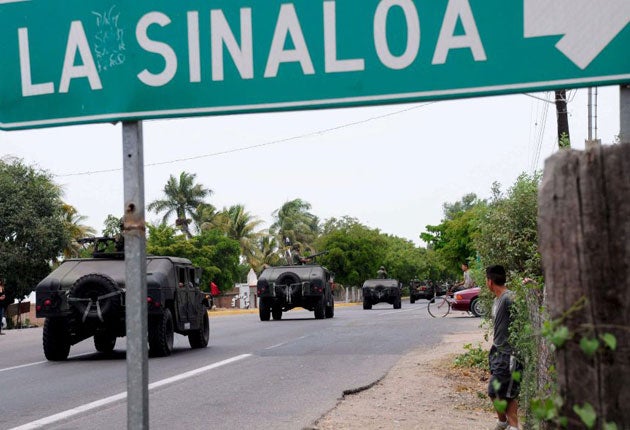Mexico's drug gangs drive film crew out of town
Escalating violence is forcing Hollywood and US tourists to stay away. Guy Adams reports

Your support helps us to tell the story
From reproductive rights to climate change to Big Tech, The Independent is on the ground when the story is developing. Whether it's investigating the financials of Elon Musk's pro-Trump PAC or producing our latest documentary, 'The A Word', which shines a light on the American women fighting for reproductive rights, we know how important it is to parse out the facts from the messaging.
At such a critical moment in US history, we need reporters on the ground. Your donation allows us to keep sending journalists to speak to both sides of the story.
The Independent is trusted by Americans across the entire political spectrum. And unlike many other quality news outlets, we choose not to lock Americans out of our reporting and analysis with paywalls. We believe quality journalism should be available to everyone, paid for by those who can afford it.
Your support makes all the difference.Mexican drug cartels don't like rivals treading on their territory; they don't like the police poking around; and now, it seems, they don't much care for Hollywood taking an interest in their business.
Producers of a film about the murder of a cocaine smuggler, which would have starred Eva Mendes, Josh Hartnett and Sir Ben Kingsley, have been forced to abandon filming on the Mexican coast after the movie-makers received death threats.
Queen of the South, based on a novel by Arturo Perez-Reverte, was due to be filmed in Sinaloa, on the country's northern coast. But, following a decision by Jonathan Jakubowicz, its Venezuelan director, and two of his producers, the plug has now been pulled on the project. "I've worked really hard to make this beautiful movie, but the safety of my family and my team comes first," Jakubowicz told Variety. "Making this movie [would have] put us all at risk, not only in Mexico but in the US."
The news will heighten fears that Hollywood production, which has become a growing contributor to the Mexican economy, may disappear from the country, amid the surge in violence which has killed nearly 7,000 people in the past year. Jakubowicz and his family apparently received threats while at home in Los Angeles. The shaken film-maker this week warned colleagues to think twice before attempting to take on similar projects. "I beg those involved to be responsible and mindful of the dangerous territory the subject matter inevitably gets them into," he said.
"We wanted to shoot in the city of Culiacan in Sinaloa, northern Mexico, the epicentre of the drug wars, but it just wasn't possible. The world should pray for peace in Mexico."
Many other Hollywood producers, who may be tempted to shoot south of the border because of lower production costs and tax incentives, are also now starting to think twice. Security has been a growing problem since 2005, when Jennifer Lopez and Antonio Banderas's Bordertown was forced to move production to New Mexico after its crew was followed and had their hotel rooms ransacked.
Last year, the makers of a Paramount film called El Traspatio (The Backyard) reported that an actress from Ciudad Juarez, where they were shooting, had found a slaughtered lamb on her doorstep, with a death threat pinned to it. She was replaced, for her own safety. Several other crew members on the film, about local drug murders, reported receiving sinister anonymous phone calls.
The jumpiness in Hollywood is bad news for the Mexican economy, which has been hit by the global downturn together with a precipitous decline in the tourist trade after the US State Department advised citizens against crossing the border. Free-spending foreign visitors are virtually absent from resorts such as Tijuana, which would in the past have been packed with revellers for spring break, when North American schools are closed for the week.
The escalating security problems, which have seen hundreds of gruesome public murders, are the result of a government crackdown on drug cartels which control the cocaine trade into the US, worth $5.5bn (£4bn) a year.
Although several drug cartel bosses have been arrested, rival groups are now battling over their former territories. Thousands of police officers, many with financial ties to cartels, have been killed. Army units are being brought in to patrol some border areas.
The US government is concerned that if the violence continues to spread, Mexico could acquire the label of "failed state". Hillary Clinton, the US Secretary of State, who visited the country last week, publicly admitted that the security problems were being fuelled by the failure of the US to stem both the supply of drugs into its border areas, and the flow of weapons in the opposite direction.
Join our commenting forum
Join thought-provoking conversations, follow other Independent readers and see their replies
Comments